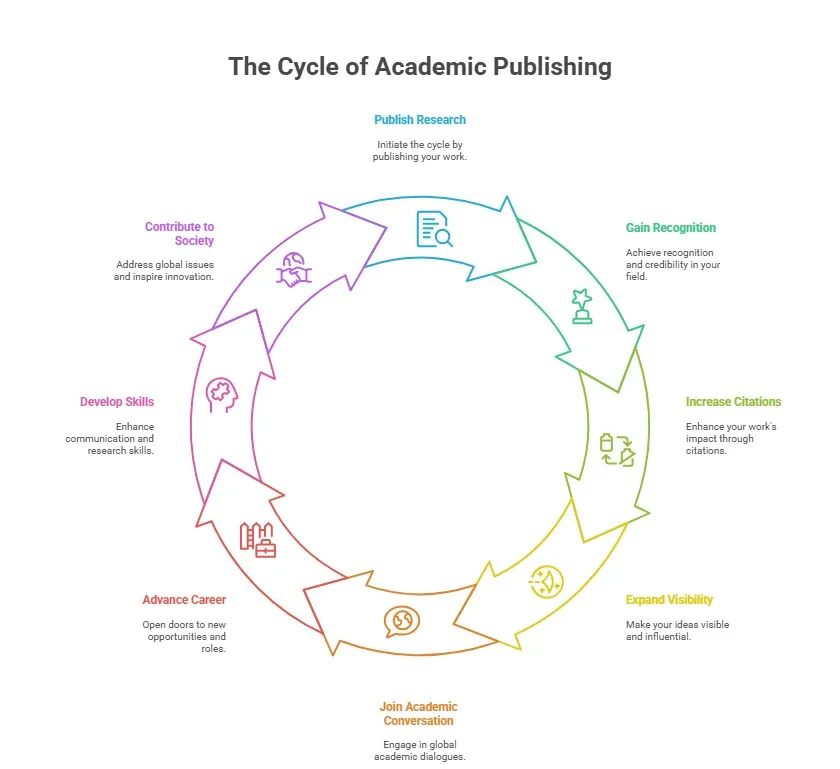Introduction
You have a concept, have gathered some information, and have documented your results. What comes next? It may seem daunting or unnecessary to Publishing Your Research whether you’re a student or an early career researcher. However, the truth is that one of the best decisions you can make is to publish your study for your future academic and professional success. It helps you establish reputation in your field and opens doors to opportunity, employment, and recognition. Imagine your efforts adding to a worldwide knowledge base that is expanded upon by others. It’s similar to sowing seeds in the forest of learning. This article will explain the importance of publishing your study and how it might influence your future.

Academic Visibility and Recognition
- Publishing is about placing yourself on the academic map, not merely about filling out your resume. Your name is linked to a subject or concept when you publish a paper. Over time, this leads to recognition and credibility in your field. The earlier you start, the more time your name has to grow within your discipline.
- Universities, scholarships, and research grants are highly competitive. A published paper (or two) can help you stand out from a sea of similar applicants. It shows initiative, discipline, and a drive to contribute. And let’s be real—having your name in an academic journal feels amazing.
- Faculty members, supervisors, and colleagues often take note when students publish. It’s a sign that you’re serious about your academic journey. Publishing your research gives you confidence, but it also earns you the respect of those around you.
Increased Citations and Research Impact for Publishing Your Research
- When you publish, others can cite your work in their research. The more your work is cited, the more it spreads, leading to a chain reaction that amplifies your impact. It’s like throwing a pebble into a pond—ripples extend far beyond the initial splash.
- Ideas that sit on your hard drive don’t help anyone. Publishing your research puts your thoughts, findings, and innovations into the world where they can be seen, discussed, and developed further. Your ideas deserve an audience.
- Publishing means you’re part of a much larger academic conversation. You’re no longer just a student or junior researcher—you’re a contributor. You join dialogues that shape fields, influence theory, and advance innovation.
Career Advancement and Job Opportunities for Publishing Your Research
- In academia, your publication record often speaks louder than your GPA. If you plan to pursue postgraduate studies, teaching roles, or research positions, a portfolio of published work can be your golden ticket.
- Grad school committees want evidence that applicants can produce original work. What better proof than a published article? It shows you understand research ethics, formatting, peer review, and time management.
- Many conferences, research internships, and academic programs require or prefer candidates who’ve published. Once you start, doors open to collaborations, funding, and even travel. Publishing truly expands your world.
Skill Development and Critical Thinking
- Good research is useless if you can’t explain it. Publishing pushes you to express complex ideas in simple, precise language. These communication skills are crucial, whether you’re pitching a paper or giving a TED talk.
- Writing for publication teaches discipline. From drafting and editing to formatting and citing, every step builds valuable skills. Plus, responding to peer reviewers improves your ability to receive and apply constructive feedback.
- Publishing your research gives your insight into peer review—a core part of academic credibility. You’ll learn how to revise based on critiques, defend your choices, and refine your work. These lessons shape you into a stronger thinker and writer.
Societal Contribution and Real-World Impact
- Not all research is for the ivory tower. It has the capacity to address global issues, enhance systems, and transform lives. When you publish your work, other scholars, governments, non-governmental organizations, or companies can use your solutions.
- Your research could lead to the next big idea. Your article might serve as a springboard for someone else’s breakthrough, regardless of the topic you’re researching—clean energy, school reform, or digital healthcare.
- Publishing enables the public, educators, and policymakers to see your work. Your thoughts can raise awareness and guide choices, whether they are shared online, in conferences, or in scholarly publications.
Conclusion
There’s more to publishing your study than merely putting it on your resume. It’s a statement that your opinion counts in your industry. It improves your academic standing, hones your abilities, and provides access to more promising opportunities. Start publishing right away, regardless of your goals—whether they are to solve practical problems, alter your professional path, or just boost your self-confidence. Finally Don’t put off becoming an expert. Publicize your work and show the world what you are capable of.


Leave a Reply